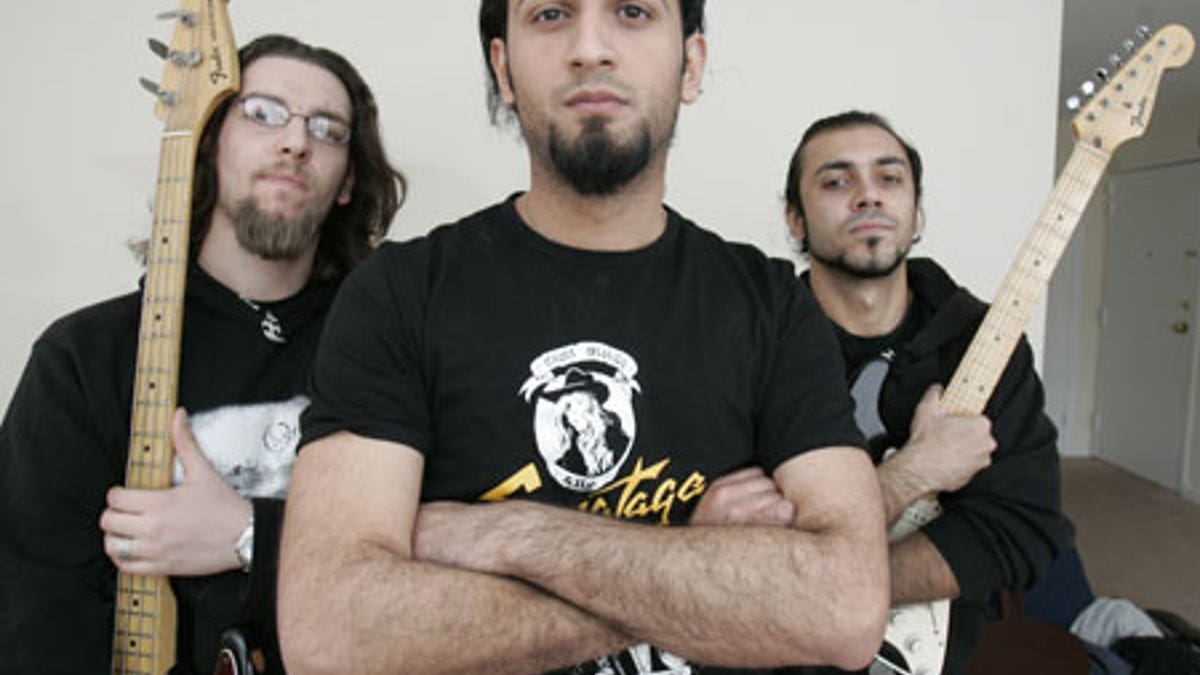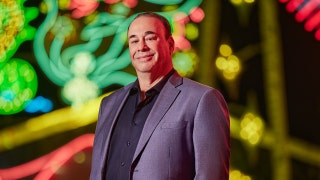
ELIZABETH, N.J. – The band Acrassicauda is rockin' in the free world, but how they got here is an immigrant song of a different type.
After avoiding Saddam Hussein's secret police, enduring the bombing of their practice space, dodging death threats and navigating sectarian warfare in their native land, four Iraqi musicians who wanted nothing more than to rock 'n' roll all night are living in New Jersey, pursuing their dreams of heavy metal stardom.
Tales of bands struggling through hard times and overcoming obstacles to stardom are as old as rock 'n' roll itself. But Acrassicauda, named after a species of black scorpion, has had a harder time than most.
PHOTOS: Acrassicauda keepin' it real in Elizabeth, NJ.
"A lot of heavy metal bands talk and sing about war and death and destruction, but they haven't experienced it," said bass player Firas al-Lateef. "We have."
After three years living as refugees in Syria and Turkey — and putting their survival ahead of their rock star dreams — the band is in America. They live in a small apartment with little more than some fold-out beds and a couple of chairs, doing the things many wannabe rock stars do: looking for jobs and women, not necessarily in that order.
"We're still in the process of figuring it all out," said drummer Marwan Riyadh, 24. "But we feel real optimistic about things. We're trying to fit in with a new culture and a new society and absorbing what's all around us. Our heads are spinning."
Acrassicauda (pronounced ah-crass-ih-COW'-dah) was formed in 2000 when Riyadh and guitarist and lead vocalist Faisal Talal met lead guitarist Tony Aziz, 30, in a Baghdad school where they were studying fine arts.
In between lessons, they realized they shared a love of heavy metal.
They joined with al-Lateef, 27, and played their first concert two months later before about 300 fans in a small Baghdad club. The city has a tiny heavy metal subculture that listened to cassettes by Metallica, Iron Maiden, Opeth, Slipknot and Savatage, purchased surreptitiously from the back of stores displaying Arabic music on the shelves.
Trouble soon followed. Saddam's secret police was seemingly everywhere, and grew suspicious when bands sang in English or languages other than Arabic, said the 25-year-old Talal.
"Our friends warned us this would happen, and they were right," he said. "They suggested we translate our lyrics into Arabic because the secret police would ask for it, and they did."
Though Acrassicauda's music deals with war and suffering, the band took pains to keep it apolitical, singing of injustices in a general sense in songs like "Between The Ashes" and "Massacre."
"It's like speaking about the killing of innocent children, but it doesn't have to be in your own country, or any particular country," Talal said.
When the U.S.-led coalition invaded Iraq and toppled Hussein in April 2003, music took a back seat to staying alive.
"We didn't expect to survive," Talal said. "During war, it's stay home, lock your door and stay indoors as much as you can. Missiles and bullets were coming down from the sky. It was always red outside."
Added Riyadh, "We spent nights when we didn't know if we would wake up the next morning."
Aziz's house was destroyed in the fighting, but he and his family weren't in it at the time and survived.
Once Hussein was toppled and fighting subsided in and around Baghdad, the band regrouped in January 2004, playing a show for 50 to 60 people at a place called the Hindia Club.
But the insurgency was gaining strength, and a different kind of danger was taking hold. Their next show attracted only five people.
One day, a note was tacked to the door of their rehearsal space.
"It said, `You better quit this; it doesn't fit with the Iraqi traditions or religion. Stop it or you will die,"' al-Lateef recalled. "We were afraid, but we figured we could die soon anyway, so the hell with it."
The band tried to ignore the threats, but they kept coming.
"We thought, `Who would hang such a thing on our wall?"' Talal said. "What had we done to deserve being killed? But then we thought, what had the baker, the shopkeeper, the guy who owns a restaurant done? And they were all killed. Everyone was a target."
In 2005, their rehearsal space was destroyed in a series of explosions that wrecked several buildings. They knew was it was time to go.
Aziz and Riyadh left first, making the 18- to 20-hour bus ride to Syria. The other two followed soon after. After a year, their visas expired, and they took refuge in Turkey.
Vice, a New York magazine, had profiled the band earlier and helped produce a film about them called "Heavy Metal in Baghdad," which was shown at the Toronto and Berlin International Film festivals.
The magazine spent about $40,000 to help support the band as the men applied for refugee status in Turkey, trying to get to America. Editors felt that, by publicizing the band, they unwittingly placed its members in even greater jeopardy and felt obligated to help.
"It's a story of hope," said filmmaker Eddy Moretti. "These four guys stand for a whole generation of young people who had to suffer through 10 years of sanctions, they suffered under Saddam, the first Gulf War was part of their childhood. They represent a generation that is the product of war. And they turned out at the end to be all right guys, not bitter or spiteful."
Applying through the United Nations High Commission for Refugees, the band went through an exhaustive screening process that included detailed background checks and face-to-face interviews with the U.S. Dept. of Homeland Security. The U.S. government had to assess whether they met the American legal criteria for refugee status, including having a well-founded fear of persecution in their homeland.
Finally, they had to get exit visas from the Turkish government. It took almost two years, but the band members started arriving in the U.S. last fall with the help of the International Rescue Committee, which found them their apartment in New Jersey and is helping them look for work.
Days after Riyadh arrived in the U.S. last month, three of the four band members (Aziz is in Michigan helping settle family members) got to live out every heavy metal fan's dream: a backstage meeting with Metallica at Newark's Prudential Center.
Metallica singer James Hetfield signed a guitar for them and thanked them "for keeping the faith."
Now that things are settling down, Acrassicauda is working on getting its act back together. The members admit they need a lot of practice. The band hopes to have a new three-song EP finished by the end of the year, and dreams of signing with a record label.
"We're able to play our music fast and loud, have free speech, stand on a stage without being afraid and do what we love doing, what we finally have a chance to do," said Riyadh. "We know how to cherish each moment, and these moments are precious to us, believe me."














































